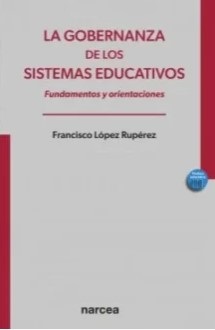- GovernancePolitics
- 30 de April de 2024
- No Comment
- 16 minutes read
López Rupérez: “Spain presents an image of stagnation in mediocrity”

López Rupérez: “Spain presents an image of stagnation in mediocrity”
Interview published by Fundación Episteme


Eva Serra
According to Francisco López Rupérez, knowledge, empirical evidence, and research would be appropriate in Spain to develop a regulatory framework that would lead to good governance in education. In his book La gobernanza de los sistemas educativos (The Governance of Educational Systems), this expert explains -among many other issues- how the characteristic features of high-performing countries demonstrate this. But, in his opinion, this is not contemplated in Spain.
Much of this interview corresponds to the webinar “Education as a weapon of political action”, an event organized by the Fundación Episteme, which featured the presence of Francisco López Rupérez. Also participating were José Antonio Martínez Sánchez, Professor of Mathematics, and Xavier Massó Aguadé, Professor of Philosophy and writer, who offered their opinions on some of the issues addressed in the subsequent discussion time.
Francisco López Rupérez holds a PhD in Physics from UCM and is a Secondary School Professor. He has an extensive and varied experience in the fields of research, practice, and educational policy. He has been Director of the Spanish Lyceum in Paris, General Director of Educational Centres of the Ministry of Education and Culture, General Secretary of Education and Vocational Training of that Ministry, and President of the State School Board. He has been the Educational Advisor in the Permanent Delegations of Spain to the OECD and UNESCO, based in Paris.
National Award for Innovation and Educational Research, he is in possession of the “Gran Cruz de la Orden civil de Alfonso X ‘el Sabio’”. Author of a hundred publications in national and foreign specialised journals and more than a dozen books; the latest and subject of this interview, The Governance of Educational Systems, (Narcea, 2021). He is currently the director of the Chair on Educational Policies at the University Camilo José Cela.
The Royal Decree 217/2022, which establishes the organisation and minimum teachings of compulsory secondary education, has just been presented. Do you consider that it provides a balance between centralisation and decentralisation as you suggest?
For more than 30 years, a necessary and internationally recommended balance between centralisation and decentralisation has been generally respected in Spain, particularly in terms of curriculum and of the distribution of competences between the central Government and the Autonomous Regions. With the LOMLOE, this balance has been broken, shifting it towards the Autonomous Regions. But, in addition, the structuring value of the development that corresponds to the State is so limited, so imprecise, so blurry and even so confusing that de facto we enter a phase of exaltation of the autonomy of the other actors. From the Chair, we have broadly documented that this will generate disorder and, ultimately, will increase territorial inequality. In addition, we have empirical evidence at international level about the fact that autonomy can be counterproductive for students’ results, if it is not accompanied by the corresponding accountability.
You defend rationality, scientific evidence, and research for good governance. To what extent do you believe that the LOMLOE complies with this approach?
The LOMLOE, through its regulatory development, has shown a disheartening face that is a manifestation of the Government’s commitments to its partners
The LOMLOE, through its regulatory development, has shown a disheartening face that is a manifestation of the Government’s commitments to its partners. This is evident on two fronts: the first, in the sense of the progressive reduction of the constitutional role of the State in the basic organization of the educational system, and another in the complete ideological contamination of the curriculum. It is not a reform inspired by the principle of rationality -understood, according to Pinker, as “the ability to use knowledge to achieve objectives”- and regretfully, I have to say that in this way both the success of the reforms and their duration or stability are compromised.
The concept ‘Lifelong learning’ or permanent learning, is based on adjusting knowledge and skills to the changes that the context presents. Andreas Schleicher says that “it does not only mean constantly learning but also ‘unlearning’ and ‘relearning’ when the context changes”. How is it possible to foster long-term learning in a situation as diverse as the one we have?
Schleicher’s statement must be contextualized in a concept that was reformulated by the OECD in 1996, as until then, only training of adults was taken into account. It implies a paradigm shift in that the different formative phases of the individual are considered interrelated. What we do in adulthood is not independent of what we have done in youth. There is empirical evidence about that. We know that those who best take advantage of the possibilities of lifelong education are those who have received university education and, therefore, are willing to continue learning throughout life. To achieve it, we must have a solid basic training.
“Solid basic training” does not seem to have been interpreted the same everywhere. In Spain, many teachers criticise that the contents have been subjected to competences. What degree of self-criticism is there in organizations like the OECD in the face of these discrepancies?
In the opinion of some, the OECD has a neoliberal character and in the opinion of others, it has a social democratic character in educational matters. From my experience in the OECD I can testify that it has a culture of respect for facts and consideration of empirical evidence.
In Spain’s case, the orientation of the competency-based curriculum has been perverted in relation to international postulates, which are not only from the OECD
In Spain’s case, the orientation of the competency-based curriculum has been perverted in relation to international postulates, which are not only from the OECD, but also from the consensus among businessmen or those responsible for technological companies about the education we want for the future. This connects with a humanistic vision of education that revalues the role of knowledge and elevates it in category. Against this orientation, which aims to raise the bar in terms of the intellectual demand of the curriculum, because it adds to pure knowledge the “know-how” and enriches it with the “know-how to be” and the “know-how to live” together, in Spain a spurious curriculum has been created. We cannot adopt a transition from the competency-based curriculum, from a maximum approach. This misinterpretation reaches a highly ideologized approach to the curriculum. When knowledge, which is the base, is displaced, the intellectual building blocks of teaching collapses and puts the teaching staff, which is the great priest responsible for conveying the cultural heritage from one generation to the next, in a tight spot. We are in a moment of unease.
A rational approach uses knowledge to develop skills, attitudes and values; as a secondary school professor I know that this can be done
It would have been much better to adopt a gradual and well explained approach. A rational approach uses knowledge to develop skills, attitudes and values; as a secondary school professor I know that this can be done. Starting from the disciplines, we would try to train ourselves from the base of something we know, without making leaps into the void.
Without moving from “classical learning”, wouldn’t skills, attitudes and values be a natural consequence? Is it necessary to introduce skills in a specific way?
The competence-based curriculum approach places knowledge at the pinnacle of competence. In fact, when the reflection on competences is introduced for the first time, through the OECD’s DeSeCo project (Definition and Selection of Competencies) in 2001, the education ministers of the member countries propose the concept of competencies as knowledge, skills, attitudes and values. Good classical teaching, traditional teaching, has been oriented in a spontaneous way according to the competence-based approach and good teachers, even without knowing it, were applying it. The change is that now this approach is made explicit, systematic and generalised.
When we analyse certain deficits in the ‘know-how’ of our students, in the current educational system we find difficulties; for example, in language handling, in the capacity for written expression or in rhetorical skill or speech articulation. Not long ago, two MEPs were commenting on the difference between French and Spanish MEPs. The rhetorical capacity of the French is a product of their educational system which in terms of language has oriented, even without knowing it, teaching and teaching practices according to the criterion of competencies. This is not genetic.
In France, teachers are protesting in relation to the baccalauréat and they are beginning to leave the sector, as seen in l’Académie de Toulouse. Could the same thing happen here?
Multilateral organisations have been warning us of this problem for long enough. In all systems with a long bureaucratic-administrative tradition, among which ours is found, the policies of talent management of the teaching staff have been, essentially, ignored. And they basically rely on two pillars: on the policies of access to the profession and on those of professional development, absolutely essential to provide the teaching profession with the necessary strength and level of satisfaction. Educational administrations have not even considered this possibility.
There is, and there will be even more in the future, an issue of scarcity, a void in the hiring of those teachers where teaching competes with the demand from high-value-added industries and services
Last year we conducted research on teaching, in which we looked at the data from 1.5 million teachers. We saw that, in Spain, 17% of secondary school Mathematics teachers have not had an initial training in line with the subject they were teaching in the ESO. The same happens with 30% of Technology teachers. What does it mean? There is, and there will be even more in the future, an issue of scarcity, a void in the hiring of teachers where teaching competes with the demand of industries and high value-added services, where those degrees are sought, well paid and which undergo professional development. If educational policies do not pay attention to the teaching staff, the future is bleak.
We must be careful, not only in selecting the best ones, but also in taking care of them once they are inside the profession. This can be achieved with a professional development approach through the concept of ‘career plan’, in a personalized forecast. It can be incentivised and offer opportunities for advancement. There is a quote from a South Korean civil servant, often repeated by the OECD, which says: “The quality of an education system cannot exceed the quality of its teachers”. Now this is complemented by the following: “The quality of the teaching staff cannot be superior to the quality of the policies focused on the teaching staff”.
In economic terms and in terms of investment, the ‘spending paradox’ is also exposed. What does spending guarantee?
The term ‘spending paradox’ is due to UNESCO, which is not exactly a neoliberal organisation. The results and improvement of the system do not depend only on how much it is spent but on how it is spent. Sufficient spending is a necessary condition, but it is not enough. The big question is whether the amount we spend on education in Spain is sufficient or not. According to the studies carried out, it depends on the territories. In some of them, the spending variable is already saturated, in the sense of a significant expenditure whose increase will hardly mean improving the results; and others, where it is insufficient. The differences between one and the other can be in a ratio of two to one. It is likely that in order to implement consistent, effective, efficient policies, we will have to provide more resources, but it must be done on the basis of appropriate policies.

In the book, regarding the design of educational policies, you explain three models: top-down, bottom-up and circular, the last one being the most successful. What does it consist of?
I resort to geometric concepts because they are quite plastic. A top-down governance conception is hierarchical, typical of consolidated bureaucratic systems. Bottom-up is a very progressive idea, but without success or viability credentials. Circular models, more or less detailed or complex, where there are bottom-up and top-down movements, have proved to be more effective. Promoting consensus and orderly, systematic, rational participation has proven to be successful in the implementation of educational policies. For example, in Portugal. The OECD considers its curriculum reform a success, and highlights these participation movements, capturing the opinion of the different actors in an orderly way, processing, synthesising and incorporating it into a refinement process to the initial approaches. This is what I mean by ‘circularity’.
It seems that policies are promoted more in the short term in Spain, so this circular model seems difficult.
One of the intellectual bets of the book is to orient policies in accordance with a rational approach. And at the top is basing policies on knowledge, empirical evidence and research. That’s what successful educational systems have in common. We have studied the characteristical features of three high-performing countries: Finland, Singapore and Portugal. One of the characteristics they share is to base policies on knowledge, empirical evidence and research. On the contrary, in Spain we have a highly politicised governance based on protagonists, generally, underqualified for those job positions.
In Spain, we have a highly politicised governance and based on protagonists, generally, underqualified for those job positions
In your book, you tell us that currently there are no international indicators regarding the quality of governance of educational systems. If we only pay attention to the results, what is our education system indicating?
The development of the first analytical framework for the evaluation of the quality of governance – carried out through a Delphi process of consultation of experts – was performed by us and, as far as I know, is the only one available internationally. However, there are multiple comparative studies on specific policies and, of course, we have a fairly complete set of result indicators on the international level. These indicators are based on two main sources, one of an essentially administrative nature (school dropouts, enrolment rates, repetition, promotion, graduation, etc.) and another based on tests such as PISA, TIMMS, etc. In respect to these indicators, with the exception of school enrolment, Spain presents an image that corresponds to stagnation in mediocrity.
What final message (desideratum) do you think is the most appropriate to improve our educational system?
The most synthetic underlying message that emerges from my book is to bet, in an integrated way, on the “art of politics” and, at the same time, on the “science of policies”. A scientific-rational orientation of policies does not mean turning them into Physics, for example, but basing them on knowledge, empirical evidence and research. And the application of the noble art of politics to education involves the ability to have a well-founded vision of what must be done, why and what for, to maintain a balance across the board, to promote participation, to reach sensible agreements, to explain the reforms to society, to convince and inspire it, all of this in the perspective of preparing a better future for everyone.
Source: educational EVIDENCE
Rights: Creative Commons

